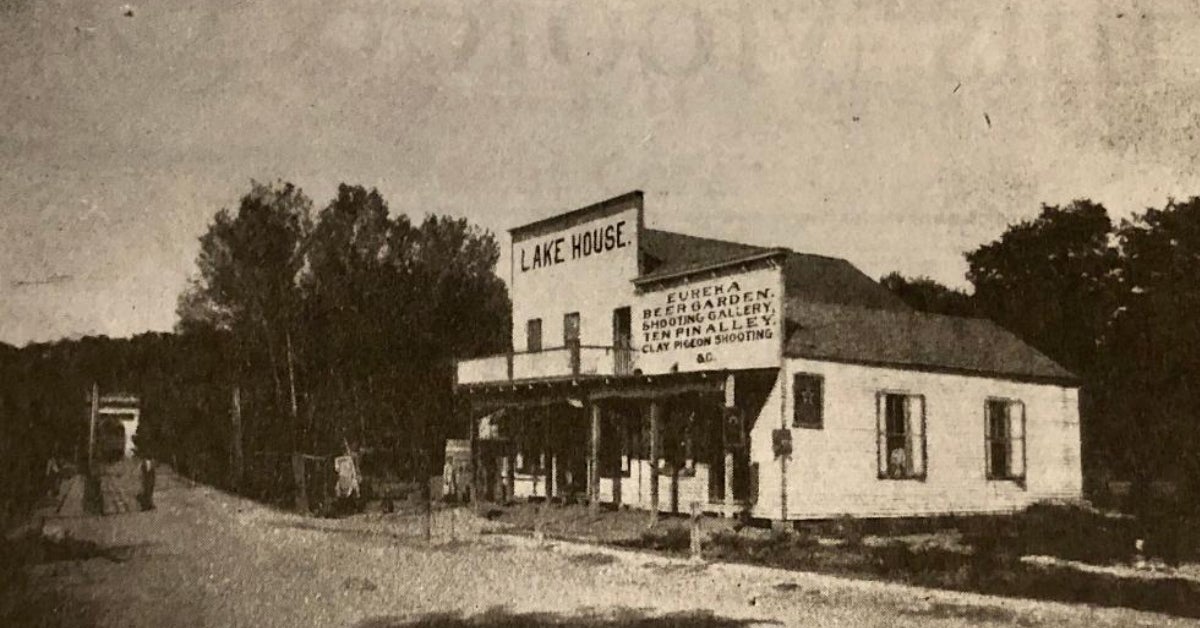LOOKING BACK: The Lake House Resort, Gatling guns and Prohibition
Published 8:00 am Wednesday, February 22, 2023

- The Lake House Resort was a popular destination from the 1880s through 1911. (Photo Submitted)
By Nancy Bell | Vicksburg Foundation for Historic Preservation
The first reference to the Lake House Resort, located next to the Vicksburg National Cemetery, fronting what was then referred to as Lake Centennial, now the Yazoo Diversion Canal, is in the Vicksburg Herald on Nov. 28, 1883, stating that John Barry, proprietor of the Lake House now has a telephone and that the number is 135.
The Lake House rented boats, leased and sold fishing equipment, sold minnows, and offered cold beer and sodas for sale. There were picnic grounds available or one could buy a ticket for an excursion on the lake, some even moonlit. An article in The Vicksburg Evening Post on March 31, 1884, reported that “Mr. John Barry’s Lake House is being improved, and is quite a popular resort during leisure moments.”
The Vicksburg Herald on May 22, 1885, informed the public that “Mr. John Barry, manager of the Lake House, has a collection of relics and curiosities which are worth seeing. Aside from the collection of war relics, he has a number of mineral specimens of rare beauty and value.”
In April 1886, a new restaurant was attached to the side of the Lake House where Isaiah Montgomery sold cold beer and soda, cigars, tobacco and confectionaries, and ice cream on Sundays. They also had a “ladies’ entrance on the south side.”
Montgomery, formerly enslaved by Jefferson and Joseph Davis, went on to found the town of Mound Bayou.
During the 1890s, Warren’s Light Artillery would hold its Gatling gun practice on the National Cemetery Road, near Barry’s Lake House and spectators were encouraged to attend, and I suppose buy refreshments. The members would mount two flour barrels on floats and place them in the lake at 600 and 1,000 yards distance and each was “thoroughly riddled, the latter being shot to pieces. About 500 shots were fired and the members of the command learned a great deal of valuable knowledge about the gun during their delivery.”
At various times from 1886-1893, Barry offered the building for rent or sale, while keeping it open. His advertisement in June 1893 stated that it was a “good location for grocery and saloon.”
In February 1894, J. Dornbusch purchased the Lake House and according to the Daily Commercial Herald planned “substantial and very handsome improvements there, which should suffice to make it a popular resort this summer. Among these will be a rifle range and public baths. The grounds will also be beautified.”
The Herald reported in May that “the shooting park at the Lake House has been so far completed that the traps were in position and ready for use last Monday. Grading the grounds has necessarily given them a rough look for the time being, but when the grass is renewed no prettier location could be desired, the cascade in Mint Spring Bayou forming a most picturesque background for the park, which occupies a natural amphitheater among the surrounding hills.”
In January 1895, he sold the building to his brother Carl, with the understanding that if he did not keep up with the mortgage payments, he would get the building back.
In July 1901, “Little” Vincent Lavecchia Jr. became the new manager of the Lake House. Then in April 1902, the Warren County Board of Supervisors granted permission to Maurice Marcus to change the location of his saloon on Hall’s Ferry to the Lake House. This, however, did not last long and in 1903 Copelain and Crayton were to open a bar and wine room that served lunch. Their permit was pulled by the Waltersville town council because Copelain was regarded as “not a proper person.”
There were a number of owners thereafter, with Denny O’Neil being arrested by the police chief in March 1910 for allegedly violating the prohibition law, which had taken effect in Mississippi on Dec. 31, 1908. The case was dismissed the following day for lack of evidence. On March 26, 1911, the Lake House was destroyed by fire, its owner Denny O’Neil rebuilding “at once,” but this building was no more.





